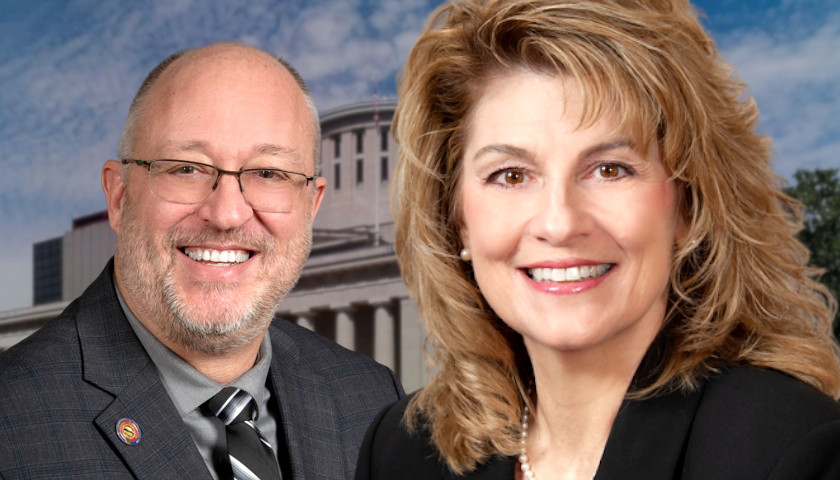Two Republican Ohio lawmakers have introduced a bill into the Ohio House of Representatives to reinforce election integrity and stop meddling in party primaries.
House Bill (HB) 210, sponsored by State Representatives Jennifer Gross (R-West Chester) (pictured above, right) and Gary Click (R-Vickery) (pictured above, left), aims to require electors who want to change political parties to register as a member of that political party by December 31st.
Currently, Ohio voters do not need to specify a party when registering. By requesting the ballot of the party primary they want at the time of voting, they can cast a vote in either the Republican or Democratic primaries. Additionally, voters can switch between parties during various elections throughout the year.
According to Section 3513.19 of the Ohio Revised Code, you can “Challenge the person is not affiliated or is not a member of the political party whose ballot the person desires to vote. Party affiliation shall be determined by examining the elector’s voting record for the current year and the preceding two calendar years using that as a standard of affiliation.”
Lt. Governor Jon Husted, the then-secretary of state, diverted from the law in 2011 by releasing a directive that forbade precinct election officials from contesting candidates’ party affiliations, a widespread practice before his direction and that the law allowed. Husted said that the boards of elections should allow voters to switch party affiliations because he wanted Democrats to become Republicans. Since that directive, no election boards have elected to follow the law.
According to Gross, changing political parties is often a political decision and not a conscious decision to become a party member, supporting the party’s principles.
The legislation looks to require electors who desire to change parties or affiliate with a party to register as a member of that political party by December 31st, preceding a primary election, to participate in that party’s primary election.
According to Gross, this legislation allows Ohio’s primary elections to run as intended.
“By establishing an advanced deadline to register for a political party, Ohio citizens can have full faith in the election process without fear of unnecessary cross-over or political raiding,” Gross said.
A former Republican lawmaker has also been pushing for Ohio to strengthen the state’s current laws to secure the primary election system and stop party raiding.
Former Ohio Congressman Jim Renacci previously told The Ohio Star that he agrees it’s time to enforce and clarify the existing law in Ohio.
“It’s time to fix and clarify the existing law in Ohio. It’s time to either challenge the elector or change the law. We need party affiliation to be a conscious decision not a political decision,” Renacci told The Star.
Ohio Secretary of State Frank LaRose‘s spokesperson Rob Nichols told The Star that the bill will prevent meddling in each other’s primaries that game the system.
“The bills will prevent the partisan mischief and meddling in each other’s primaries that game the system. Additionally, the bills rationalize Ohio’s voter database to more accurately depict party affiliation in the state. Currently, the database states that of Ohio’s eight million registered voters, 1 million are registered Democrats, 1.3 million are registered Republicans, and 5.7 million voters are unaffiliated, despite the fact that they have been voting straight ticket for years. We know that this data is not accurate or reflective of the actual partisan composition of the state. Maintaining accurate voter lists is a cornerstone to keeping Ohio elections secure and free of fraud, and these bills are a smart step in that direction,” Nichols told The Star.
The legislation is currently awaiting hearings in the Ohio House Government Oversight Committee.
– – –
Hannah Poling is a lead reporter at The Ohio Star, The Star News Network, and The Arizona Sun Times. Follow Hannah on Twitter @HannahPoling1. Email tips to [email protected]








